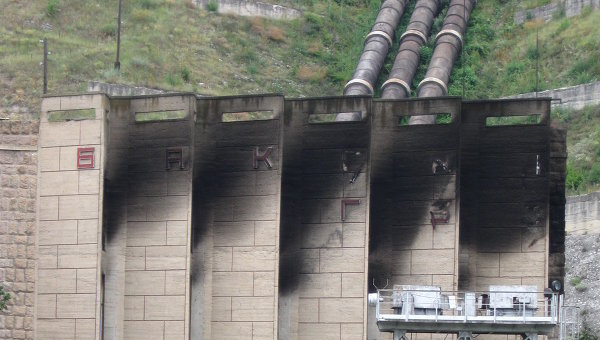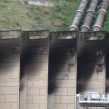
Railway and Hydroelectric Engineer Targeted in Dagestan
Publication: Eurasia Daily Monitor Volume: 7 Issue: 142

Attacks apparently carried out by insurgents and attacking infrastructure have been reported in Dagestan in the wake of the daring attack earlier this week on the Baksan hydropower station in Kabardino-Balkaria.
Russian news agencies reported that an improvised explosive device (IED) went off today (July 23) on the Inchkhe-Kayakent railway in Dagestan, wounding a security guard. According to the reports, the incident took place as a train was passing by. The train was not derailed, but around two meters of track was destroyed. A police source was later quoted as saying that the explosion on the railway was actually a controlled explosion carried out by authorities to destroy an IED they found on the railway, and that no one was hurt in the incident. Successful or not, the IED attack was the latest in a series of attacks targeting Dagestan’s railway system (www.kavkaz-uzel.ru, July 23).
Meanwhile, the chief engineer for the company Sulaksky Hydro-Energy Cascade, Vladimir Redkin, was abducted by unidentified persons from his home in the village of Shamilkala in Dagestan’s Untsukulsky district on July 22. A law enforcement source told the Kavkazsky Uzel website that rebels in the republic have demanded protection payments from the heads of many companies in the republic and that Redkin may have either refused to pay or been late in making a payment.
Dagestan’s President, Magomedsalam Magomedov, was quoted as saying on July 22: “In Dagestan, the engineer of Sulaksky Hydro-Energy Cascade has disappeared. In light of what happened at the Baksan hydropower station, this arouses increased concern and alarm. This will continue as long as we do not adequately respond, as long as the law enforcement system is in a defensive role. It is past time to switch to active operations; it is necessary to turn the tables. Bandits and terrorists should be running away from us, and they should not be hunting for law enforcement system employees” (www.kavkaz-uzel.ru, July 23).
Likewise, the First Deputy Prime Minister of Dagestan, Rizvan Kurbanov, was quoted as saying that republican authorities had repeatedly tried to enter into a dialogue with “members of the so-called extremist underground” but that these overtures had been ignored, adding, “In connection with this, I am authorized to state that we are giving the militants a final warning: either cease your extremist activities and give up or you will be destroyed.” Kurbanov said that the rebels’ accomplices “must stop assisting the ‘forest brothers’” or risk being destroyed together with the militants “within the limits of the law but without any mercy” (www.newsru.com, July 23).
The attack on Kabardino-Balkaria’s Baksan hydropower station took place on July 21, when three to five gunmen broke into the 25-megawatt station and planted five bombs on the premises. The attackers shot two guards to death, then captured and tortured two employees to find out the location of the generators, where they then planted bombs. Four of the bombs went off, destroying two of the generators and sparking a fire that took three and a half hours to extinguish (www.themoscowtimes.com, July 21).
The head of Russia’s Investigative Committee, Aleksandr Bastrykin, said on July 22 that despite the fact that the attack on the Baksan hydropower station is being actively investigated, there are, as yet, no “concrete suspects.” However, the Russian presidential envoy to the North Caucasus Federal District, Aleksandr Khloponin, said that “the circle of suspects” has been determined and that “all of these people are known.”
Meanwhile, sources in the Southern Federal District’s law enforcement bodies stated that investigators are examining the possibility that the insurgent group headed by Kazbek Tashuev (aka Abdul-Dzhabbar) was behind the recent series of explosions in Kabardino-Balkaria. Tashuev, a 31-year-old resident of Baksan, is the head of the so-called Baksan Jamaat and was considered one of the contenders to become the head of the Islamist underground in Kabardino-Balkaria following the death of Anzor Astemirov. However, Asker Dzhappuev, aka Abdullakh, was named to replace Astemirov. Some observers believe that Dzhappuev was behind the attack on the Baksan hydropower station. Still others believe that Doku Umarov, the Chechen rebel leader and emir of the Caucasus Emirate who has vowed to conduct a campaign of attacks targeting Russian infrastructure, was behind the attack on the hydropower station (www.newsru.com, July 22).
President, Dmitry Medvedev, on July 22 threatened to fire top security officials if there are further attacks on strategic infrastructure in the North Caucasus like the attack on the Baksan hydropower station. He told Deputy Prime Minister, Igor Sechin, that officials “must do all they can to make sure that such things do not happen again” and that if there are more such attacks, “security and energy company chiefs … will all be fired” (Reuters, July 22).
According to Kavkazsky Uzel, there were at least 17 bomb attacks and eight ambushes targeting law enforcement personnel in Kabardino-Balkaria between June 1 and July 20. Six law enforcement officers were killed and 10 wounded in those attacks, while one rebel was killed and five captured during the same period (www.kavkaz-uzel.ru, July 21).




